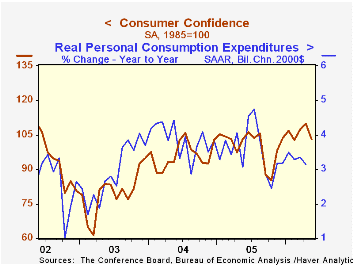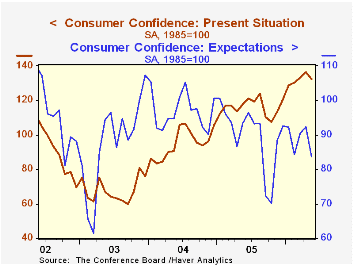 Global| May 30 2006
Global| May 30 2006Consumer Confidence Fell Less Than Expected
by:Tom Moeller
|in:Economy in Brief
Summary
Consumer confidence, as reported by the Conference Board, fell less than expected in May from what was a four year high in April. The 6.0% decline to 103.2 from a revised 109.9 contrasted with Consensus expectations for a decline to [...]

Consumer confidence, as reported by the Conference Board, fell less than expected in May from what was a four year high in April. The 6.0% decline to 103.2 from a revised 109.9 contrasted with Consensus expectations for a decline to 100.0 and compared to a 9.5% decline in the University of Michigan's May Index of Consumer Sentiment.
During the last twenty years there has been a 52% correlation between the level of consumer confidence and the y/y change in real consumer spending. The correlation rose to 66% during the last ten years.
The index of consumers' expectations slumped 9.3% (-10.4% y/y). Expectations for employment in six months slipped but expectations for an increase in income fell to the lowest level (16.6%) since 2003. Expectations for the inflation rate in twelve months rose to 5.6% versus a recent low of 4.8% in March.
Consumers' assessment of the present situation reversed the increase in April with a 2.7% decline (+12.5% y/y). The percentage of respondents who viewed jobs as plentiful (28.6%) fell moderately but the percentage that viewed jobs as hard to get (20.5%) rose to the highest level this year.
Consumers' appraisal of current business conditions fell as a lesser 28% viewed it as good and an increased 15.4% viewed it as bad.
The Conference Board’s survey isconducted by a mailed questionnaire to 5,000 households and about 3,500 typically respond.
| Conference Board | May | April | Y/Y | 2005 | 2004 | 2003 |
|---|---|---|---|---|---|---|
| Consumer Confidence | 103.2 | 109.8 | 12.4% | 100.3 | 96.1 | 79.8 |
Tom Moeller
AuthorMore in Author Profile »Prior to joining Haver Analytics in 2000, Mr. Moeller worked as the Economist at Chancellor Capital Management from 1985 to 1999. There, he developed comprehensive economic forecasts and interpreted economic data for equity and fixed income portfolio managers. Also at Chancellor, Mr. Moeller worked as an equity analyst and was responsible for researching and rating companies in the economically sensitive automobile and housing industries for investment in Chancellor’s equity portfolio. Prior to joining Chancellor, Mr. Moeller was an Economist at Citibank from 1979 to 1984. He also analyzed pricing behavior in the metals industry for the Council on Wage and Price Stability in Washington, D.C. In 1999, Mr. Moeller received the award for most accurate forecast from the Forecasters' Club of New York. From 1990 to 1992 he was President of the New York Association for Business Economists. Mr. Moeller earned an M.B.A. in Finance from Fordham University, where he graduated in 1987. He holds a Bachelor of Arts in Economics from George Washington University.
More Economy in Brief
 Global| Feb 05 2026
Global| Feb 05 2026Charts of the Week: Balanced Policy, Resilient Data and AI Narratives
by:Andrew Cates






